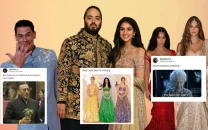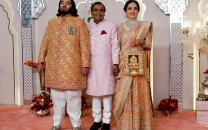Who are you to say anything to me: Iffat Omar slams trolls, haters
Actor made a powerful statement addressing the criticism she often faces
1709188792-0/IffatUmar-(1)1709188792-0-640x480.webp)
Iffat Omar recently made a powerful statement addressing the criticism she often faces regarding her choice of clothing. Speaking on the podcast, The Youth Wave, Iffat delivered a bold message to her detractors, particularly those who engage in body-shaming and question her dressing style.
While the host joked about prominent advertisements for "mardana kamzori" being prevalent, even though those for "zanana kamzori" seemed to be absent, Iffat expressed, “That is the main reason why I am so disliked by people, especially the boys' club." She yelled out phrases like "dou takkay ki aurat" and "talaaq yafta aurat" - words that have previously been used to describe her. "Why do you wear such short clothes, don't you feel ashamed?" exclaimed Iffat, mimicking her haters.
"It is between Allah and I - who are you to say anything to me?" asked the star assertively. "I speak without fear," she stated further, claiming that she can silence anyone. "I'm anti-establishment, I speak up then too. Whoever is the governing party, I speak up about them because I have not committed thievery. No one can blackmail me. I don't have scandals. Fine, I had one or two affairs, the third married me. I've never hidden anything. What will you dig and hold against me?"
The actor acknowledged that her outspoken nature, which includes calling out various individuals and even establishments, contributes to the polarised opinions about her. She emphasised her commitment to doing what she believes is right, regardless of societal expectations or judgments. "I can't be blackmailed which is why I can speak the truth. And being truthful is my weakness."
Iffat's candid response reflects her unwavering commitment to personal freedom and the right to make choices without succumbing to societal norms or judgments. Her message resonates with a broader conversation on individual agency and the importance of embracing diversity in personal expressions and lifestyles.
As an influential figure in the entertainment industry, Iffat's fearless attitude not only challenges stereotypes but also encourages discourse on the significance of respecting personal choices. Her words serve as a reminder that empowerment comes from self-acceptance and the refusal to be confined by societal expectations.
Have something to add? Share it in the comments





-(1)1720859193-0/Untitled-design-(83)-(1)1720859193-0-208x130.webp)













COMMENTS
Comments are moderated and generally will be posted if they are on-topic and not abusive.
For more information, please see our Comments FAQ